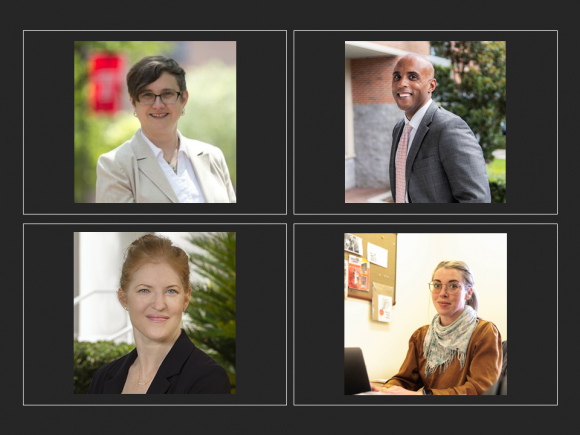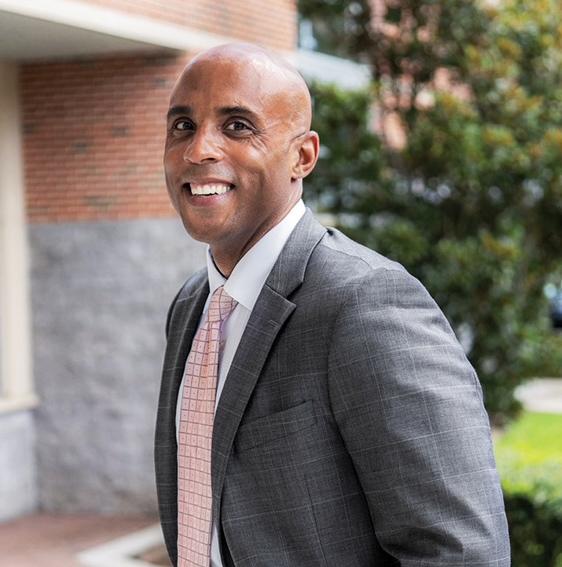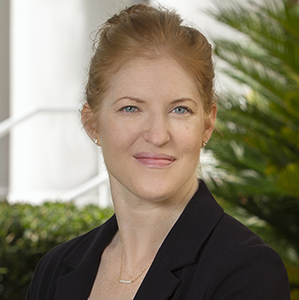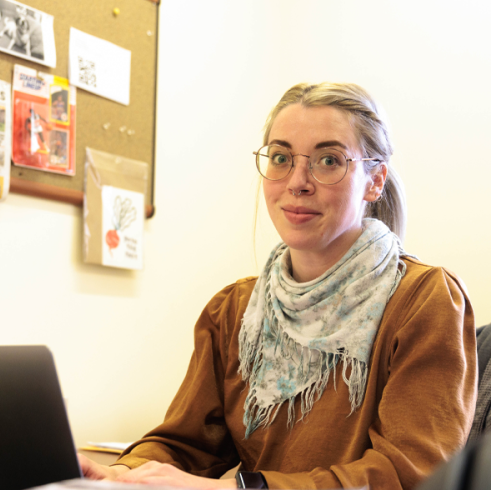
Leonore Carpenter, Shani King, Sarah Swan, and Elenore Wade share their teaching philosophies, goals for the future, and advice for law students.
Faculty members at Rutgers Law School are scholars, teachers, practitioners, mentors, and leaders. They represent one of the most diverse communities of legal scholars in the nation. And they share a passion for teaching in and out of the classroom, allowing students to master their skills and put their knowledge to work in research, amicus briefs, and clinical projects.
This fall, four professors will join the faculty, enhancing the Rutgers Law community with their expertise in children’s advocacy, LGBTQ issues, racial justice, and more.

Leonore Carpenter, Associate Professor of Law, joins Rutgers Law from Temple Law School, where she’s served on the faculty since 2008. Previously, she worked as a public interest attorney and, ultimately, as legal director of a Philadelphia-based LGBTQ advocacy organization called Equality Advocates Pennsylvania. Her research primarily focuses on the role lawyers can play in creating meaningful social change, exploring legal ethics, public interest lawyering, and social movements, and her work has been published in the Georgetown Law Journal, The University of Pennsylvania Journal of Law & Social Change, and others.
Why does teaching appeal to you?
I truly love teaching first-year students legal research and writing because I can actually see them starting to develop into lawyers, and it’s really gratifying to be able to watch them take concrete steps toward realizing their professional goals. I love teaching students about public interest lawyering and sexual orientation and gender identity law because those are areas that I’m personally really invested in and passionate about, and it makes me happy to be able to talk about those issues with people who are also interested in them. And I love teaching professional responsibility because I think that the ethical issues involved in the practice of law are profound and very challenging, and very much worth thinking about deeply.
What is your advice for law students?
Make sure you’re taking care of yourself. Our profession is really bad at modeling work-life balance and overall self-care to law students, but just because the profession can be an unhealthy place doesn’t mean that you have to accept that for yourself. Eat, sleep, go outside, seek help when you’re feeling emotionally out of balance, and when you are looking for jobs, avoid workplaces that seem to have a toxic culture. Remember that law can be a wonderful career that you will enjoy for decades—you don’t want to burn out after just a few years.

Shani King, Professor of Law, is most recently a Professor of Law at the University of Florida Levin College of Law, and Director of its Center on Children and Families. He is experienced in international and transnational law, human rights, and children’s advocacy, as a former attorney for Legal Services for Children in San Francisco, Inc., where he represented children in immigration, school discipline, guardianship, and other proceedings. He is the author of four books and his scholarship has been published in the California Law Review, Harvard Human Rights Journal, Cornell Journal of Law and Public Policy, and others.
Why does teaching appeal to you?
I’ve been very fortunate to have a wonderful career, and teaching is one way in which I can give back to help others have the opportunities that I’ve had. It’s also important to me to help create and strengthen pathways for people from traditionally underserved backgrounds, something that I can do directly through mentoring and teaching, but also indirectly through training future generations of social justice lawyers.
How would you describe your teaching philosophy?
Most importantly, it’s to be a role model for students both inside and outside of the classroom. I had a few professors and mentors that I have a tremendous amount of respect for, and that is what they did for me. It also involves teaching my students to strive for excellence, engaging in a student-centered educational process, challenging my students to think critically, challenging them to work hard to improve their advocacy—both written and oral—and modeling empathy.
What is your advice for law students?
Believe in yourself and know that you belong. Also, during your journey, get to know a few of your professors and be sure they get to know you—trust me, these connections will help you your entire career.

Sarah Swan, Associate Professor of Law, comes to Rutgers Law from the Florida State University College of Law. A former Columbia Law School Fellow, Swan’s main scholarly focus centers around issues of third-party responsibility. Specifically, her scholarship explores local government law and institutional and corporate responsibility in facilitating or failing to prevent sexual assault, among other issues. Her academic articles have appeared in the Harvard Law Review (forthcoming), Duke Law Journal, UCLA Law Review, Vanderbilt Law Review and Emory Law Journal.
Why does teaching appeal to you?
I love seeing students develop into attorneys and advocates with the power and ability to create meaningful change in society and to help make life better for others.
How would you describe your teaching philosophy?
I think students learn best by doing, so I incorporate many questions and hypotheticals into the classroom. Problem sets are fun to puzzle through, and they help illuminate our understanding of doctrine and develop our ability to apply the law to various factual scenarios.
What would you do if you weren't teaching law?
I would probably be a practicing attorney, likely for an organization like the ACLU or a legal aid organization. Or a writer.
What is your advice for law students?
Law students often want to know what “the answer” is, without realizing that in law school, carefully reasoning through the best arguments available on both sides usually is the answer!

Elenore Wade, Assistant Professor of Law, joins Rutgers Law from the George Washington University Law School, where she was a Visiting Associate Professor and Friedman Fellow in the Prisoner & Reentry Clinic, an intensive litigation clinic where students write and argue motions on behalf of prisoners seeking early release after decades of incarceration. While at GW Law, she also helped develop and teach in a racial justice reading group taught by the clinical faculty. She has prior experience as a staff attorney and Equal Justice Works Fellow at Bread for the City in Washington, DC, where she focused on public benefits and welfare rights.
Why does teaching appeal to you?
To me, there is nothing more exciting than finding a personalized way to make a tough topic click for a student. Teaching is an opportunity to help law students build confidence in their skills, improve their ability to self-identify strengths and weaknesses in their work, and discover new interests and career paths.
What do you hope to accomplish as a Rutgers faculty member?
I hope, primarily, that my students will gain confidence in their writing and problem solving abilities through practice and through my guidance. And, on a personal level, my goal is to increase the profile of my scholarship and further develop my identity as a legal scholar.
What is your advice for law students?
My advice for law students is build solidarity and collaboration with your fellow students. Law school has a reputation for being competitive, but things are better when students work together to demand a quality education and when they share lessons learned. If you’re a quick learner, be kind to those who are not. And if you feel behind, don’t be too hard on yourself; law school is here to teach you things you don’t know, and there’s always a learning curve.